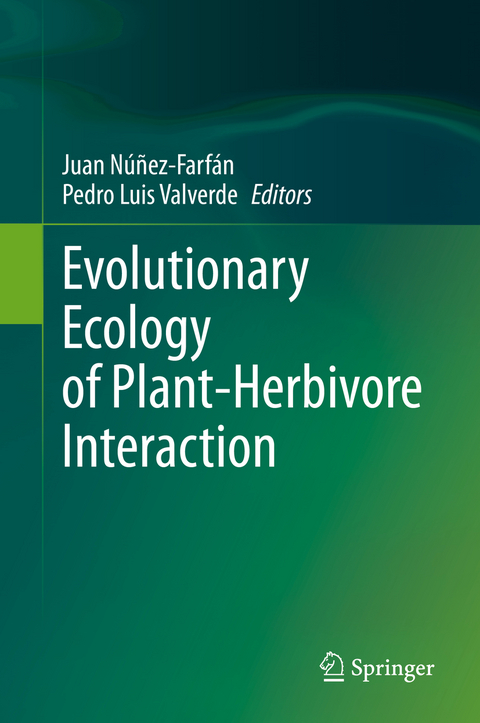
Evolutionary Ecology of Plant-Herbivore Interaction
Springer International Publishing (Verlag)
978-3-030-46011-2 (ISBN)
Juan Núñez-Farfán has been a Professor at the Department of Evolutionary Ecology, Institute of Ecology, National Autonomous University of Mexico (UNAM), since 1993. He earned his PhD at UNAM (1991) and completed his postdoctoral studies at the Department of Organismic and Evolutionary Biology, Harvard University (1991-1993). He has been a Visiting Professor at the University of Connecticut (1999-2000), where he worked on plasticity with Professor C.D. Schlichting. Dr. Núñez-Farfán is currently investigating the ecological genetics of plant defenses against herbivores, particularly with the plant Datura stramonium , using population and quantitative genetics. He has served as Director of the Graduate Program in Biology at UNAM, and was the founder President of the Ecological Society of Mexico (SCME). He teaches evolution and quantitative genetics to undergraduate and graduate students. Pedro Luis Valverde received his Bachelor's degree from the Metropolitan Autonomous University, Campus Iztapalapa (UAMI) in Mexico City, in 1990. Since 1992 he has been a faculty member at the Department of Biology, UAMI. He completed his Master of Science in Ecology and his Doctorate in Ecology at the National Autonomous University of Mexico (UNAM) in 1994 and 2001, respectively. From 2010 to 2012, he conducted research on natural selection and resistance to herbivores at the University of Seville, Spain. His chief research interests are in plant-animal interactions and the evolutionary ecology of plant defenses against herbivorous insects, as well as the reproductive biology and ecology of Cactaceae. Presently, Dr. Valverde is President of the Ecological Society of Mexico (SCME).
Chapter 1 - Introduction: Plant-herbivore interaction.- Section I - The evolution of Plant Defense.- Chapter 2 - Natural selection of plant defense against herbivores in native and non-native ranges.- Chapter 3 - Plant demographic effects of herbivores.- Chapter 4 - Towards a unifying quest for an understanding of tolerance mechanisms to herbivore damage and its eco-evolutionary dynamics.- Chapter 5 - The extended microbiota: how microbes shape plant-herbivore interactions.- Chapter 6 - How plants defend themselves is based on what they remember.- Chapter 7 - Ecological genomics of insect-plant interactions: The case of gall inducing insects.- Chapter 8 - The ecology of inbreeding depression in plant defense.- Chapter 9 - The role of trichomes in plant-herbivore interactions.- Chapter 10 - Resource allocation and defense against herbivores in wild and model plants.- Section II - Community ecology of interactions.- Chapter 11 - Intra-specific variation in plant-arthropod traits and interactions along ecological gradients: evidence from latitudinal studies.- Chapter 12 - Ecosystem engineering by insect herbivores: non-trophic interactions in terrestrial ecosystems.- Chapter 13 - What is a better source? Sex-biased herbivory and its effects on tritrophic interactions.- Chapter 14 - Natural herbivore regulation in tropical agroecosystems: importance of farming practices and landscape structure.- Chapter 15 - Functional Plant Traits and Plant-herbivore Interactions.- Chapter 16 - The evolutionary context of interactions between herbivorous insects, pathogenic fungi and their host plants.- Chapter 17 - Plant domestication and trophic interactions.- Chapter 18 - Defaunation, domestication, and dispersal in plant communities.- Chapter 19 - Meta-analysis of the diversity and structure of understory plant communities in tropical forests impacted by Defaunation.- Chapter 20 - To escape or to defend? The role of enemies in bare and edaphically challenging environments.- Chapter 21 - Plant defense evolution: a macroevolutionary approach in the genus Datura.- Chapter 22 - The evolution and diversification of a neotropical generalist herbivorous: The history of the grasshopper Genus Sphenarium Charpentier, 1842.- Chapter 23 - Evolution among weevils and their host plants: interaction between the genera Trichobaris LeConte and Datura L.- Chapter 24 - Host chemical divergence is a better predictor of herbivore diversity than latitude.- Chapter 25 - Concluding remarks.
"The focus is on the areas of expertise of the authors-their research topics, systems, and approaches-giving the volume the feel of an enjoyable chat with an outstanding group of scientists. ... This would be a great book for a graduate seminar, laboratory group, or anyone looking to cover a diversity of plant-herbivore topics. It is an enjoyable reminder of or introduction to how varied the field is." (William C. Wetzel, The Quarterly Review of Biology, Vol. 96 (2), June, 2021)
“The focus is on the areas of expertise of the authors—their research topics, systems, and approaches—giving the volume the feel of an enjoyable chat with an outstanding group of scientists. … This would be a great book for a graduate seminar, laboratory group, or anyone looking to cover a diversity of plant–herbivore topics. It is an enjoyable reminder of or introduction to how varied the field is.” (William C. Wetzel, The Quarterly Review of Biology, Vol. 96 (2), June, 2021)
| Erscheinungsdatum | 01.08.2020 |
|---|---|
| Zusatzinfo | XIX, 376 p. 48 illus., 40 illus. in color. |
| Verlagsort | Cham |
| Sprache | englisch |
| Maße | 155 x 235 mm |
| Gewicht | 751 g |
| Themenwelt | Naturwissenschaften ► Biologie ► Botanik |
| Naturwissenschaften ► Biologie ► Evolution | |
| Naturwissenschaften ► Biologie ► Genetik / Molekularbiologie | |
| Schlagworte | Agricultural practices impact on insect interactio • Agricultural practices impact on insect interactions • Defaunation in plant communities • Diversification of herbivores • Patterns of plant defense along latitudinal gradie • Patterns of plant defense along latitudinal gradients • plant functional traits • Plant mating system and defense • Plant tolerance to damage |
| ISBN-10 | 3-030-46011-8 / 3030460118 |
| ISBN-13 | 978-3-030-46011-2 / 9783030460112 |
| Zustand | Neuware |
| Haben Sie eine Frage zum Produkt? |
aus dem Bereich


